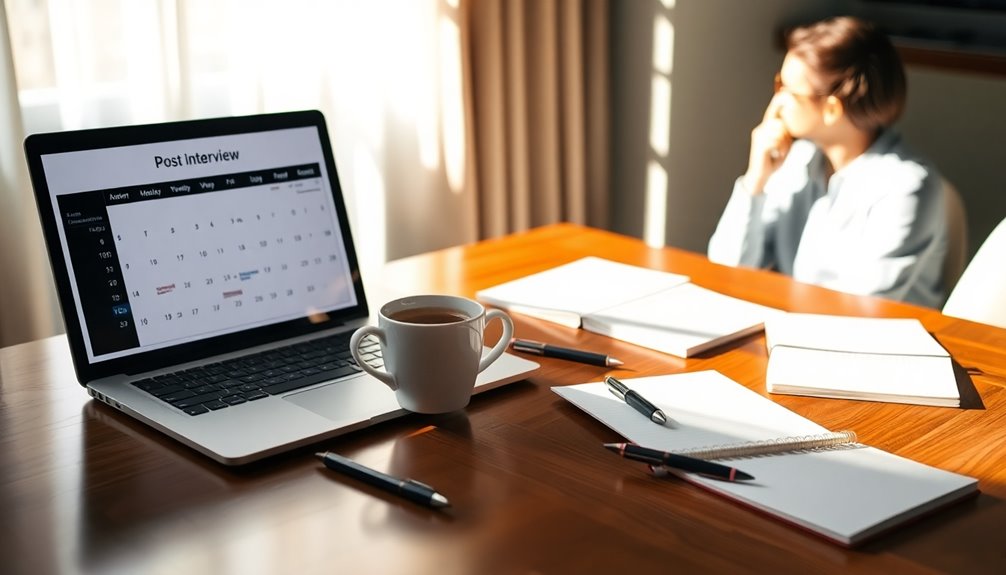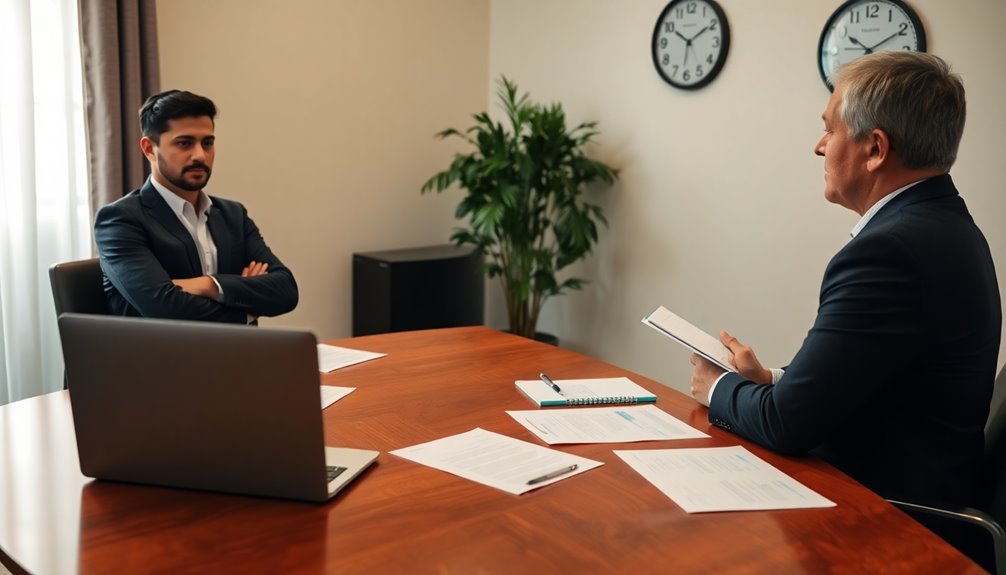To master teamwork interview questions with confidence, you need to grasp the significance of collaboration. Anticipate common queries like handling conflicts or reflecting on team failures. Use the STAR method—Situation, Task, Action, Result—to structure your answers effectively. Highlight your strong communication skills, adaptability, and problem-solving abilities to show you're a valuable team player. Remember, employers look for individuals who can learn from setbacks and foster open dialogue. With practice, you'll articulate your experiences clearly and impress interviewers. If you keep going, you'll uncover even more strategies to elevate your interview performance.
Key Takeaways
- Practice the STAR method to structure your responses about teamwork experiences clearly and effectively.
- Reflect on past teamwork experiences to identify key contributions and lessons learned from successes and failures.
- Familiarize yourself with common teamwork interview questions to prepare thoughtful and relevant answers.
- Highlight strong communication skills and adaptability, showcasing your ability to thrive in diverse team environments.
- Emphasize a growth mindset, demonstrating your willingness to learn from challenges and improve team dynamics.
Importance of Teamwork

Teamwork drives success in any organization, enabling individuals to collaborate effectively toward common goals.
When you work as part of a team, you enhance communication and foster collaboration, which leads to increased productivity.
You'll find that diverse perspectives spark innovation, allowing you to tackle challenges creatively.
A supportive team environment boosts morale, making it easier for everyone to thrive.
It's important to assess your collaboration abilities and understand your preferences for teamwork versus independent work.
This awareness helps you identify the right fit for your role and enhances your contribution to team success.
Embracing teamwork not only helps you achieve organizational objectives but also creates a positive atmosphere where everyone feels valued and engaged.
Common Teamwork Interview Questions

When preparing for interviews, it's important to anticipate questions that assess your teamwork skills.
Employers want to understand how you collaborate and contribute to a team's success. Here are three common teamwork interview questions you might face:
- "Describe a time when you worked successfully as part of a team."
- "How do you handle conflicts within a team?"
- "Can you give an example of a team project that failed and what you learned?"
STAR Method Explained

The STAR method is a powerful tool for structuring your responses in interviews, especially when discussing teamwork experiences. It stands for Situation, Task, Action, and Result.
Begin by describing the context of your experience (Situation) and the specific challenge or goal you faced (Task). Next, outline the steps you took to address the situation (Action), focusing on your contributions and collaboration with your team.
Finally, share the outcome of your efforts (Result), highlighting any positive impacts on the team or project. This method not only helps you stay organized but also guarantees your answers are clear and impactful.
Key Qualities Employers Seek

Employers look for specific qualities that can make or break a team's success. When you're preparing for teamwork interviews, focus on showcasing these key traits:
- Strong Communication Skills: Being able to express ideas clearly and listen effectively is essential for collaboration.
- Flexibility and Adaptability: Employers value team members who can shift roles and responsibilities as needed, demonstrating versatility.
- Problem-Solving Abilities: Your capacity to navigate challenges and propose solutions can greatly impact a team's dynamics.
Additionally, fostering strong communication skills and practicing mindfulness can enhance collaboration and reduce misunderstandings in team settings. Highlighting these qualities in your responses won't only resonate with interviewers but also show your readiness to contribute positively to any team environment.
Learning From Team Failures

Failures in team projects can feel like a heavy weight, but they often present the best opportunities for growth and learning.
When a project doesn't go as planned, take a moment to reflect on what went wrong. Was it a lack of communication, unclear roles, or missed deadlines? Identifying these issues helps you avoid repeating the same mistakes in the future.
Emphasize the importance of setting clear communication expectations and fostering an environment where team members feel comfortable sharing their thoughts. Learning from failures not only strengthens your own skills but also enhances the team's dynamic.
Strategies for Answering Questions

When facing teamwork interview questions, having a solid strategy can make a big difference in how you present yourself. Here are three effective strategies to contemplate:
- Use the STAR Method: Structure your answers using Situation, Task, Action, and Result to provide clear, concise responses.
- Highlight Contributions: Focus on your specific role and contributions to the team's success, showcasing how you added value.
- Learn from Experiences: Discuss lessons learned from both successes and failures to demonstrate growth and adaptability.
Motivating and Engaging Teams

Motivating and engaging teams is essential for fostering a productive and positive work environment. When you prioritize motivation, you empower your team members to contribute fully. Here are some strategies you can implement:
| Strategy | Description |
|---|---|
| Regular Check-ins | Schedule frequent one-on-one meetings to discuss goals and feedback. |
| Celebrate Achievements | Acknowledge both small and big wins to boost morale. |
| Encourage Collaboration | Foster a culture of teamwork through collaborative projects. |
| Provide Growth Opportunities | Offer training and development to enhance skills. |
Emphasizing self-love within the team can significantly enhance interpersonal relationships and overall motivation.
Frequently Asked Questions
How Can I Prepare for Teamwork Interview Questions Effectively?
To prepare for teamwork interview questions effectively, start by reflecting on your past team experiences. Identify specific situations where you contributed to success or faced challenges.
Use the STAR method to structure your responses, focusing on your actions and the results. Practice articulating how you handle conflicts and engage team members.
Additionally, familiarize yourself with key qualities employers seek, like communication skills and adaptability, to demonstrate your fit for the role.
What Should I Avoid When Discussing Teamwork Experiences?
When discussing teamwork experiences, avoid blaming others for failures. For instance, if a project didn't go as planned, don't point fingers; instead, focus on what you learned.
Highlight your role in the team's dynamics and how you contributed positively. Also, steer clear of vague statements; be specific about your actions.
How Do I Demonstrate My Adaptability in Team Settings?
To demonstrate your adaptability in team settings, share specific examples where you adjusted your approach based on team dynamics.
Talk about situations where you took on different roles or shifted your communication style to meet the needs of your teammates.
Highlight how you handled unexpected challenges, showing your willingness to embrace change and support others.
This not only showcases your flexibility but also your commitment to achieving team goals and fostering collaboration.
What if I Have Limited Team Experience to Share?
So, you've got limited team experience, huh? Ironically, that's a unique opportunity!
You can highlight any collaborative efforts, like group projects in school or volunteer work. Focus on your willingness to learn and adapt. Emphasize how you value teamwork and are enthusiastic to grow in this area.
Share what you've observed in successful teams, too. Remember, everyone starts somewhere, and your perspective can be invigorating for potential employers!
How Can I Assess a Company's Teamwork Culture During Interviews?
To assess a company's teamwork culture during interviews, you should ask specific questions about collaboration and team dynamics.
Inquire about how teams communicate, resolve conflicts, and celebrate successes. Pay attention to the interviewer's responses and observe their enthusiasm when discussing teamwork.
You can also ask about team-building initiatives and how they promote a positive work environment. This'll give you valuable insights into whether the company aligns with your teamwork values.
Conclusion
To sum up, mastering teamwork interview questions can greatly enhance your chances of landing the job. Remember, 83% of employers value collaboration skills as essential when hiring. By leveraging the STAR method and highlighting your unique contributions, you'll present yourself as a strong team player. Don't shy away from discussing both successes and learning experiences. With these strategies, you'll not only navigate interviews with confidence but also demonstrate your ability to thrive in any team environment.









